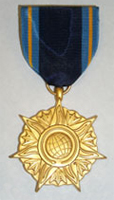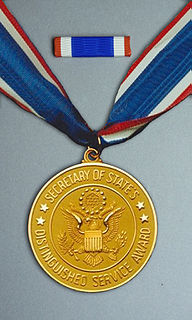
The Distinguished Service Medal (DSM) is a military award of the United States Army that is presented to any person who, while serving in any capacity with the United States military, has distinguished himself or herself by exceptionally meritorious service to the Government in a duty of great responsibility. The performance must be such as to merit recognition for service that is clearly exceptional. Exceptional performance of normal duty will not alone justify an award of this decoration.
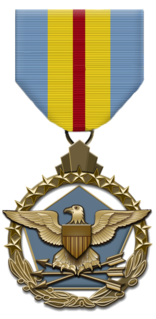
The Defense Distinguished Service Medal is a United States military award which is presented for exceptionally distinguished performance of duty contributing to the national security or defense of the United States. The medal was created on July 9, 1970, by President Richard Nixon in Executive Order 11545.

The Distinguished Conduct Medal, post-nominal letters DCM, was established in 1854 by Queen Victoria as a decoration for gallantry in the field by other ranks of the British Army. It is the oldest British award for gallantry and was a second level military decoration, ranking below the Victoria Cross, until its discontinuation in 1993 when it was replaced by the Conspicuous Gallantry Cross. The medal was also awarded to non-commissioned military personnel of other Commonwealth Dominions and Colonies.

The Distinguished Service Cross is the second highest military award that can be given to a member of the United States Army, for extreme gallantry and risk of life in actual combat with an armed enemy force. Actions that merit the Distinguished Service Cross must be of such a high degree that they are above those required for all other U.S. combat decorations but do not meet the criteria for the Medal of Honor. The Distinguished Service Cross is equivalent to the Navy Cross, the Air Force Cross, and the Coast Guard Cross.

The Distinguished Service Medal (DSM) was a military decoration awarded until 1993 to personnel of the Royal Navy and members of the other services, and formerly to personnel of other Commonwealth countries, up to and including the rank of Chief Petty Officer, for bravery and resourcefulness on active service at sea.
Distinguished Service Medal (DSM) is a high award of a nation.
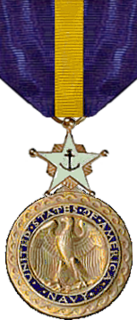
The Navy Distinguished Service Medal is a military decoration of the United States Navy and United States Marine Corps which was first created in 1919. The medal is presented to recognize distinguished and exceptionally meritorious service to the United
States while serving in a duty or position of great responsibility. The award is the Navy and Marine Corps equivalent to the Army Distinguished Service Medal, the Air Force Distinguished Service Medal, and the Coast Guard Distinguished Service Medal. The Navy Distinguished Service Medal was originally senior to the Navy Cross, until August 1942 when the precedence of the two decorations was reversed. Currently, it is worn after the Defense Distinguished Service Medal and before the Silver Star Medal.

The Air Force Distinguished Service Medal was created by an act of the United States Congress on July 6, 1960. The medal was intended as a new decoration of the United States Air Force to replace the policy of awarding the Army Distinguished Service Medal to Air Force personnel.

The Coast Guard Distinguished Service Medal (CGDSM) is a personal decoration of the United States Coast Guard that was established 4 August 1949. Prior to this date, members of the Coast Guard were eligible to receive the Navy Distinguished Service Medal. The medal is presented for, "Exceptionally meritorious service to the government in a duty of great responsibility."
A member of the armed forces mentioned in dispatches is one whose name appears in an official report written by a superior officer and sent to the high command, in which his or her gallant or meritorious action in the face of the enemy is described.
Awards and decorations of the National Guard are presented to members of the United States National Guard and sometimes to members of the state defense forces in addition to regular United States military decorations. Each of the state governments of the United States maintains a series of military decorations for issuance to members of the National Guard, with such awards presented under the authority of the various state adjutants general.

The Queen's Police Medal (QPM) is awarded to police officers in the United Kingdom and Commonwealth of Nations, for gallantry or distinguished service. It was created on 19 May 1954, when it replaced the King's Police and Fire Services Medal (KPFSM), which itself replaced the King's Police Medal (KPM) in 1940. The KPM was introduced by a Royal Warrant of 7 July 1909, initially inspired by the need to recognise the gallantry of the police officers involved in the Tottenham Outrage.
The United States military inter-service awards and decorations are those medals and ribbons which may be awarded to all members of the five military branches of the U.S. Armed Forces. Each military branch awards inter-service awards under the same criteria.
Awards and decorations of the United States Army are those military awards including decorations which are issued to members of the United States Army under the authority of the Secretary of the Army. Together with military badges such awards provide an outward display of a service member's accomplishments.
Awards and decorations of the United States government are civilian awards of the U.S. federal government which are typically issued for sustained meritorious service, in a civilian capacity, while serving in the U.S. federal government. Certain U.S. government awards may also be issued to military personnel of the United States Armed Forces and be worn in conjunction with awards and decorations of the United States military. In order of precedence, those U.S. non-military awards and decorations authorized for wear are worn after U.S. military personal decorations and unit awards and before U.S. military campaign and service awards.
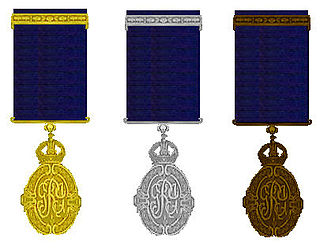
The Kaisar-i-Hind Medal for Public Service in India was a medal awarded by the Emperor/Empress of India between 1900 and 1947, to "any person without distinction of race, occupation, position, or sex ... who shall have distinguished himself by important and useful service in the advancement of the public interest in India."
The Distinguished Service Medal (DSM) is a military decoration awarded to personnel of the Australian Defence Force for distinguished leadership in warlike operations. The DSM was introduced in 1991 and is the second highest distinguished service decoration in the Australian Honours System. Recipients of the Distinguished Service Medal are entitled to use the post-nominal letters "DSM". Since its inception 152 awards have been made—which includes six Bars—with the most recent being announced in the 2017 Australia Day Honours.
The Indian honours system is the system of awards given to individuals for a variety of services to the Republic of India. The categories of awards are as follows -
The Armed Forces of India are eligible for a myriad of military decorations. Decorations are awarded for extraordinary bravery and courage, as well as distinguished service during times of war and peace. Service and campaign medals have been awarded throughout the history of India as an independent state.
